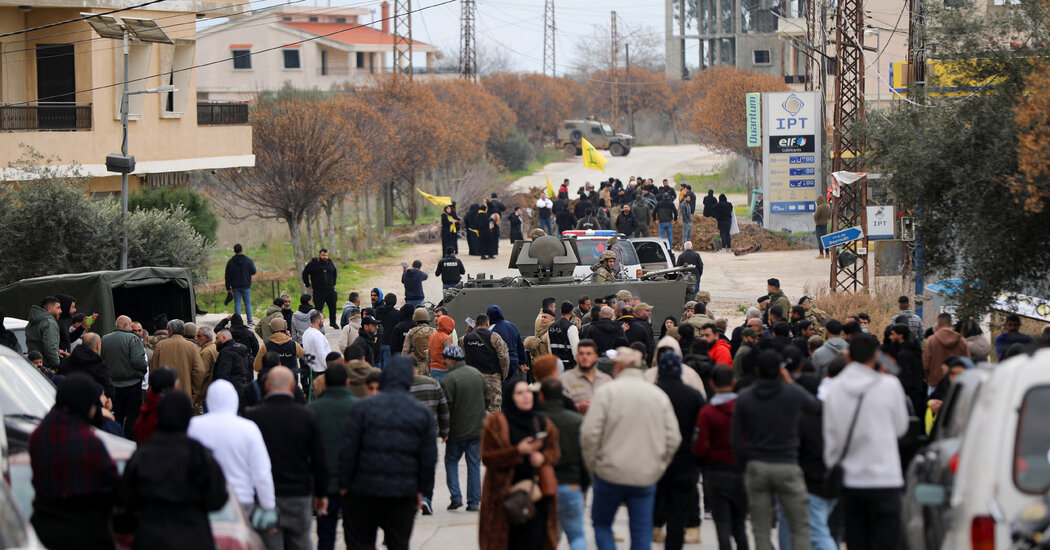At least three people were killed and more than 40 wounded by Israeli forces in southern Lebanon on Sunday, Lebanese officials said, as a 60-day deadline for both Hezbollah and Israel to withdraw from the south expired and thousands of Lebanese displaced by the war poured onto roads leading south back to their homes.
The agreementwhich was signed in November and halted the deadliest war in decades between the two sides, stipulated that both Hezbollah and Israel would withdraw their forces from southern Lebanon while the Lebanese army and peacekeepers would be deployed to secure the area. Negotiators hoped the cease-fire agreement would be permanent and restore a measure of calm to the turbulent region.
But as the deadline passed on Sunday, a very different scenario was taking shape.
Israeli forces remained in parts of southern Lebanon in defiance of the ceasefire agreement, raising fears of a permanent Israeli occupation and renewed hostilities between Israel and Hezbollah. Israeli officials have warned Lebanese not to return to their homes in many towns and villages in the south.
“In the near future, we will continue to inform you about the places you can return to,” Avichai Adraee, an Arab spokesman for the Israeli military, posted on social media Sunday morning. “Until further notice, all previously published guidance remains in effect.”
Lebanon’s health ministry said those injured on Sunday morning were trying to enter their villages along the border when they encountered Israeli attacks. Residents of some southern towns demanded that their neighbors gather early Sunday morning and head to their homes in convoy, despite warnings from Israel. The Lebanese army said accompanying civilians were returning to several border towns to try to ensure their safety. The army said in a statement that a Lebanese soldier was among those killed by Israeli fire.
The Israeli military did not immediately respond to a request for comment on the casualties. In recent days, Israeli officials have cited concerns that Hezbollah remains active and doubtful in southern Lebanon the ability of the Lebanese army to stymy group.
These claims could not be independently verified, and the five-member committee overseeing the implementation of the ceasefire has not released any information regarding Hizballah’s compliance with the terms of the ceasefire.
On Sunday, Mr. Adraee blamed Hezbollah for the inflammatory situation. Hezbollah’s radio station, Al Manar, urged residents on Saturday to return to their villages, pledging that “nothing will keep them away from the land.”
In the southern city of Aita al-Shaab, Most of them now lie in ruinsmany heeded those calls and began streaming back to their homes on Sunday, reaching streets and flattened buildings.
Mohamed Srour, the town’s mayor, was among those returning after being displaced for more than a year. He said Israeli troops had not yet fully withdrawn from the city and claimed they were shooting sporadically at civilians. The claims could not be independently verified. Still, Mr. Srour remained determined.
“Today, Aita celebrates his long-awaited return. he said. “Homes are destroyed and livelihoods are gone, but our will to live is stronger. We will build again. “
The situation presents a critical test for Lebanon’s new leader, the president Joseph Aoun and premier-design Nawaf Salamas it seeks to regain some political control from Hezbollah, the country’s dominant political and military force, and build a functioning state. Mr Aoun urged civilians to enforce the restrictions on Sunday, but stressed that the country’s sovereignty was “indefensible”.
Any prolonged Israeli occupation of southern Lebanon could breathe new life into Hezbollah, the group that was founded to liberate Lebanon from Israeli occupation and has portrayed itself as the only force capable of protecting Lebanon’s borders, experts say.
It also threatens to derail the current political momentum in Lebanon, where for the first time in decades there is a serious push to consolidate all military power in the state and eliminate Hezbollah’s justification for its vast arsenal.
In Lebanon, the focus now is on “disarming Hezbollah and transitioning from an era in which Hezbollah was seen as having the right to obtain weapons,” said Mohanad Hage Ali, deputy director of research at the Carnegie Middle East Center in Beirut, Lebanon, the Lebanese capital. Any long-term Israeli occupation “would put a break on this momentum that’s happening organically,” he added.
Hezbollah officials did not respond to Israeli accusations that the group remained militarily active in southern Lebanon, but said they were “committed” to the terms of the ceasefire.
On Saturday, Lebanese army officials said they were ready to complete their deployment in the south, but were delayed “due to the delay in withdrawal by the Israeli enemy,” according to a Lebanese army statement.
This month, a US general is overseeing a ceasefire monitoring committee that has expressed confidence in the Lebanese army’s ability to secure southern Lebanon. The military continues to demonstrate that it “has the capability, intent and leadership to secure and defend Lebanon,” Gen. Jasper Jasper Jeffers said in declaration.
The 60-day ceasefire came into effect more than a year after Hezbollah began firing rockets at Israeli positions in solidarity with its ally Hamas, the Palestinian militant group in Gaza that led the October 7, 2023, attack on Israel. Israel retaliated Assassination of Hezbollah leadershipleveling towns and villages along the border and invading southern Lebanon.
Even before Sunday’s deadline, thousands of Lebanese displaced by the war from their homes along the southern border were preparing to return home. On Saturday, the main highway leading from Beirut to southern Lebanon was jammed with cars, even as people received automated phone calls from Israel’s military warning them not to return home.
Israeli forces appeared to continue an effort that persisted during the 60-day truce by bulldozing and blocking roads between some villages in southern Lebanon, according to local news media. Israel currently occupies roughly 70 percent of the areas it captured after invading Lebanon last fall, According to the UN Peace Force in South Lebanon.
Hezbollah has not said how it plans to respond to Israel’s continued occupation of Lebanese soil. On Friday, Hezbollah officials warned in a statement that if Israeli forces remained in Lebanon beyond Sunday, it would be “an attack on Lebanese sovereignty and the beginning of a new chapter of occupation.”
Some Hezbollah lawmakers have vowed retaliation. But other officials from Hezbollah – which has been battered militarily and politically in recent months – instead shifted responsibility for Israel’s response to the Lebanese government. The group’s statement on Friday said it was up to the state to “reclaim the land and release it from the grip of occupation”.
This shift of responsibility is for Hezbollah, which a few months ago called on the state to provide for the thousands of Lebanese displaced by the war that has dragged the country into it. The political posture of the group, whose founding principle resists Israeli occupation, nevertheless reflects Hezbollah’s current weakened state.
After 14 months of fighting, the Shiite Muslim group’s military ranks are crazed and its loyal support base is tired. Its patron Iran has also been weakened by Israel, questioning Tehran’s ability to provide millions of dollars to rebuild the homes of Hezbollah supporters in Lebanon, as it did after the month-long war with Israel in 2006.
And in neighboring Syria, rebels toppled Iran’s ally, dictator Bashar al-Assad, cut off Hezbollah’s land bridge for receiving weapons and cash from Iran.
The strikes loosened Hezbollah’s once-iron grip on political power in Lebanon and shifted the country’s political sands for the first time in decades. This month, Lebanese lawmakers elected a new president, Mr. Aoun, after years of political gridlock that many analysts attributed to Hezbollah. A few days later, lawmakers named Mr. Salam, a prominent diplomat who Hezbollah had long installed as prime minister.
In a country where no major political decision has been made for years without Hezbollah’s blessing, the development underscored how much ground the group has lost.
But Middle East experts warned against writing off Hezbollah’s political weight. And if Israel continues to occupy Lebanon, it could reinvigorate the group’s mostly Shiite Muslim support base as it seeks a patron and protector against Israeli forces.
“I believe that neither side is interested in renewing the war,” said Sami Nader, director of the Institute of Political Science at the University of Beirut in Saint Joseph. “But if Israel occupies Lebanon, it revives the Hezbollah narrative.”
Sara Chaito contributed reporting.






